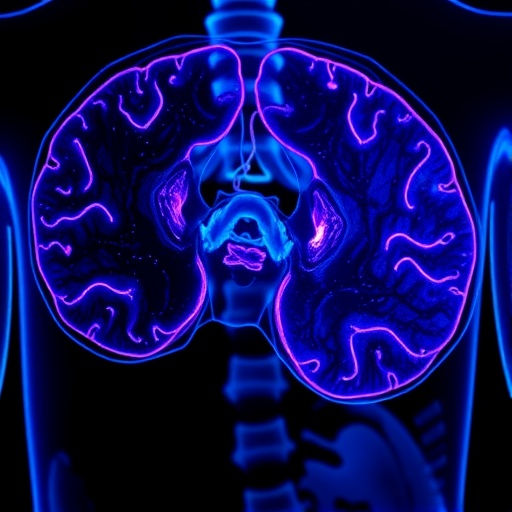In a groundbreaking study published in BMC Cancer, researchers uncover pivotal insights into the role of UHRF1 in the progression of prostate cancer (PC), particularly through its interaction with NF-κB signaling pathways. This discovery not only reveals new molecular underpinnings driving tumor progression but also suggests promising avenues for prognosis and targeted therapy in PC. The research leverages extensive bioinformatics datasets alongside robust experimental validation, marking a significant advance in understanding the molecular biology of one of the most prevalent cancers affecting men worldwide.
Prostate cancer remains a formidable challenge in oncology, primarily due to its ability to progress aggressively and develop resistance to traditional androgen deprivation therapy (ADT). The NF-κB/p65 signaling pathway has emerged as a critical mediator of tumor survival and resistance mechanisms, yet the precise molecular regulators of this pathway in PC have remained elusive. This study shines a light on UHRF1, an epigenetic regulator traditionally known for its role in DNA methylation maintenance, now repositioned as a driver of NF-κB activation and cancer progression.
The investigation began with the bioinformatics analysis of the GSE104749 dataset, which revealed differentially expressed genes implicated in PC. Among these, UHRF1 stood out due to its marked overexpression in tumor tissues compared to benign counterparts. This initial insight was rigorously validated across independent cohorts from The Cancer Genome Atlas (TCGA) and Gene Expression Omnibus (GEO), reinforcing the gene’s potential relevance in prostate oncogenesis.
To bridge the gap between computational predictions and clinical reality, the authors performed Western blotting and immunohistochemical analyses on patient-derived specimens. These experiments confirmed that elevated UHRF1 expression correlates strongly with higher Gleason scores, advanced clinical staging, lymph node involvement, and distant metastasis—hallmarks of aggressive disease. Such associations underscore UHRF1’s role not just as a molecular marker, but as an active participant in malignant progression.
Survival analyses further cemented the prognostic value of UHRF1 expression. Patients exhibiting high levels of UHRF1 had significantly shorter overall survival (OS) and disease-free survival (DFS), highlighting its potential as a biomarker for poor clinical outcomes. Importantly, multivariate Cox regression models demonstrated that UHRF1 independently predicts biochemical recurrence (BCR), even when accounting for established clinical parameters.
Seeking to enhance predictive accuracy, the researchers integrated UHRF1 levels with Gleason score and prostate-specific antigen (PSA) into a novel prognostic model. This composite model achieved a robust concordance index (C-index) of 0.752, suggestive of high discriminatory power in risk stratification. The validated nomogram derived from this model offers clinicians a powerful tool for individualized prognosis, potentially guiding therapeutic decision-making.
Beyond correlative data, the study delved into mechanistic functions of UHRF1 within PC cells. Through genetic manipulation experiments, silencing UHRF1 resulted in reduced cellular proliferation, increased apoptosis, and alterations in cell cycle progression. In contrast, overexpression of UHRF1 enhanced these oncogenic phenotypes. Notably, UHRF1 also promoted aerobic glycolysis—a known metabolic hallmark of cancer—thereby facilitating the energetic and biosynthetic demands of tumor growth.
At the molecular level, UHRF1 was shown to physically interact with p65, a key transcription factor of the NF-κB pathway. Co-immunoprecipitation assays confirmed this binding, while phosphorylation levels of p65 were elevated in UHRF1-overexpressing cells. These biochemical insights reveal that UHRF1 acts to potentiate NF-κB signaling, promoting downstream transcriptional programs that support survival and malignancy in prostate cancer cells.
Given these multifaceted roles, UHRF1 emerges as a nexus linking epigenetic regulation, metabolic reprogramming, and inflammatory signaling within the PC microenvironment. The cumulative impact accelerates tumor progression and may underlie resistance to conventional therapies, suggesting that targeting UHRF1 could provide a novel therapeutic angle.
This study’s integration of big data analytics with molecular and cellular biology exemplifies the growing power of interdisciplinary approaches in cancer research. By harnessing publicly available gene expression datasets and complementing them with rigorous lab experimentation, the authors present a compelling case for the clinical relevance of UHRF1.
In future directions, therapeutic strategies directly inhibiting UHRF1 or disrupting its interaction with p65 could be explored, potentially halting the NF-κB-driven oncogenic cascade. Additionally, the prognostic model developed here warrants further validation in larger, prospective clinical trials to confirm its utility in clinical practice.
Overall, the discovery situates UHRF1 as both a biomarker and a therapeutic target, advancing our grasp on prostate cancer’s complex biology. The translational potential highlighted by this research could ultimately translate into improved patient stratification and novel treatment modalities, addressing the unmet need for effective management of aggressive and therapy-resistant prostate cancers.
By elucidating the molecular crosstalk between UHRF1 and NF-κB signaling, this study not only deepens the mechanistic understanding of prostate cancer but also charts a path forward for targeted interventions that can improve survival rates and quality of life for patients afflicted by this disease. The integration of metabolic and epigenetic factors into the cancer progression narrative opens exciting possibilities for multifaceted therapeutic development.
As prostate cancer remains a leading cause of cancer-related morbidity and mortality among men, such insights are vital for the evolution of precision medicine. With UHRF1 emerging as a crucial modulator within the oncogenic network, researchers and clinicians alike now have a promising biomarker and target to focus on in both early diagnosis and advanced disease contexts.
This compelling research advances the frontier of prostate cancer biology, highlighting how epigenetic regulators orchestrate complex signaling pathways that shape tumor fate. These findings underscore the importance of continuous exploration into the molecular drivers of cancer to unmask vulnerabilities and develop next-generation therapies capable of turning the tide against this pervasive disease.
Subject of Research: The role of UHRF1 in prostate cancer progression via modulation of NF-κB signaling.
Article Title: UHRF1 and NF-κB signaling in prostate cancer progression insights from bioinformatics and experimental validation.
Article References:
Wang, Y., Wang, J. & Ren, G. UHRF1 and NF-κB signaling in prostate cancer progression insights from bioinformatics and experimental validation. BMC Cancer 25, 1697 (2025). https://doi.org/10.1186/s12885-025-15091-y
Image Credits: Scienmag.com




